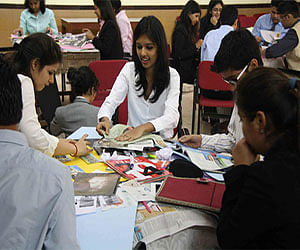
Going by the current pace of spending and factors like shortage of quality teachers, India will take a whopping 126 years to reach standards of education on par with developed nations, a report said today.
The paper by Assocham calls for “dramatic” changes in the country''s education system and claims that although India has made rapid strides, the yawning gap between the standards of education is not likely to be bridged soon as the developed world has not slowed down spending on education.
It said with India spending a mere 3.83 per cent of its gross domestic product (GDP) on education, the amount is not sufficient to catch up with developed economies, adding that it will take "six generations or 126 years to catch up with developed countries if we do not change our education system dramatically".
In contrast, the US spends 5.22 per cent of its GDP on education, Germany spends 4.95 per cent while for UK it is 5.72 per cent, reported PTI.
"With the high GDP base of these developed countries, the absolute money earmarked for education is huge. For instance the size of the US GDP would be something like seven times the size of the Indian GDP and then on top of it, its ratio on education on a higher base would be very significant,' said Assocham Secretary General D S Rawat.
Noting that India has resource constraints, the paper suggests the country to reach the levels of spending as recommended by the United Nations, which wants countries to spend at least 6 per cent of their GDP on education.
Moreover, shortage of quality teachers is among the major challenges facing the education sector. At present, the shortage of teachers has been measured at 1.4 million.
Besides, 20 per cent of the teachers do not measure up to the standards of the National Council for Teachers Education (NCTE).
Also, due to absence of focus on effective skill development, India is one of the least skilled countries.
The paper by Assocham calls for “dramatic” changes in the country''s education system and claims that although India has made rapid strides, the yawning gap between the standards of education is not likely to be bridged soon as the developed world has not slowed down spending on education.
It said with India spending a mere 3.83 per cent of its gross domestic product (GDP) on education, the amount is not sufficient to catch up with developed economies, adding that it will take "six generations or 126 years to catch up with developed countries if we do not change our education system dramatically".
In contrast, the US spends 5.22 per cent of its GDP on education, Germany spends 4.95 per cent while for UK it is 5.72 per cent, reported PTI.
"With the high GDP base of these developed countries, the absolute money earmarked for education is huge. For instance the size of the US GDP would be something like seven times the size of the Indian GDP and then on top of it, its ratio on education on a higher base would be very significant,' said Assocham Secretary General D S Rawat.
Noting that India has resource constraints, the paper suggests the country to reach the levels of spending as recommended by the United Nations, which wants countries to spend at least 6 per cent of their GDP on education.
Moreover, shortage of quality teachers is among the major challenges facing the education sector. At present, the shortage of teachers has been measured at 1.4 million.
Besides, 20 per cent of the teachers do not measure up to the standards of the National Council for Teachers Education (NCTE).
Also, due to absence of focus on effective skill development, India is one of the least skilled countries.








